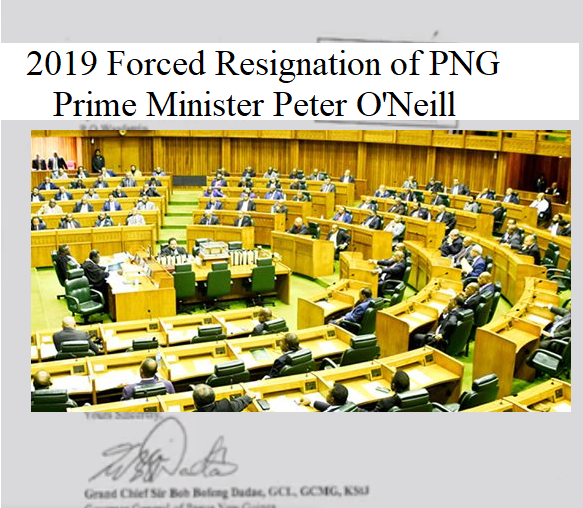In Papua New Guinea (PNG), the mechanisms for holding the Prime Minister accountable and potentially removing them from office are outlined in the country's Constitution, Section 145 (screenshot).
(Important: This article is a simple analysis of Section 145 on the VoNC in PNG and the election of a new prime minister. Written in a simple style for our readers to understand how it - the VoNC - works.
Meanwhile, we are looking forward to giving it similar coverage on MAY 28! - CLICK HERE TO READ THE LATEST ON THE MAY/JUNE PARLIAMENT SITTING.
While a vote of no confidence (VoNC) is one such mechanism, there are several others, including:
- dismissal for breaching the Leadership Code,
- removal on health grounds,
- suspension pending investigation, and
- resignation, death, or court-invalidated election of the Prime Minister.
PNG's Constitution, Section 145 (screenshot)
Key Processes and Procedures for a Vote of No Confidence
A VoNC motion in PNG follows a specific set of processes and procedures to ensure transparency and accountability within the parliamentary system. These include:
- 1. Expressed Motion of No Confidence: The motion must explicitly state its nature as a vote of no confidence in the named Prime Minister, adhering to the constitutional provisions.
- 2. Naming of Alternate Prime Minister: The motion must identify an alternate Prime Minister as per constitutional requirements.
- 3. Signature of Mover and Seconder: The motion requires signatures from both the individual moving the motion and the person seconding it, following parliamentary standing orders.
- 4. Support of Members of Parliament: Signatures from not less than one-tenth of the Members of Parliament who support the motion are necessary.
- 5. Exclusion of Mover and Seconder as Supporters: It's crucial to maintain the distinction between those moving and seconding the motion and those supporting it.
- 6. Correct Electorate Name and Signature Column: Accuracy in stating the electorate's name and proper completion of the proposal form are essential.
------
PRIME MINISTERS OF PAPUA NEW GUINEA 1975 - 2024
Process Timeline: 2019 Vote of No Confidence
The 2019 VoNC in PNG provides a clear example of the process, including the timeline and duration of events:
1. Expressed Motion of No Confidence
April 11th: Finance Minister James Marape's resignation set the stage for the VoNC, indirectly expressing a lack of confidence in the existing leadership.
2. Naming of Alternate Prime Minister
May 6th: Laguna Camp named James Marape as the Alternative Prime Minister, a crucial step in the VoNC process.
3. Signature of Mover and Seconder
May 7th: Parliament convened to table the VoNC motion. Signatures of the mover (Marape) and seconder played the initial role in steamrolling the formal process.
The parliamentary session ensured the correct completion of the proposal form, including accurate details regarding the electorate's name and the appropriate signature columns.
4. Support of Members of Parliament
May 2nd - 28th: Various party splits, resignations, and realignments occurred, influencing the support base for the VoNC motion. The People's National Congress (PNC) and Pangu Pati members played crucial roles in expressing or changing their support.
5. Exclusion of Mover and Seconder as Supporters
The distinction between those moving and seconding the motion (Marape and others) and those supporting it was maintained throughout the process.
6. Process Duration
May 28th: The VoNC voting session was initially scheduled for 7 days but extended to 21 days. This duration allowed for a comprehensive deliberation on the motion.
7. Constitutional Requirements Compliance
Throughout May: Various legal and constitutional elements were in play, such as the Attorney General applying for a Stay Order on the VoNC motion to uphold the rule of law.
8. Outcome and New Prime Minister Election
May 29th: The culmination of the process resulted in Peter O'Neill's resignation as Prime Minister and the election of James Marape as the new Prime Minister, securing 101 votes.
From the parliamentary session convened on May 7th to the final vote on May 29th, the Vote of No Confidence process in Papua New Guinea spanned a total of 23 days.
Throughout this period, various political manoeuvres, including resignations, party splits, and coalition changes, influenced the outcome of the VoNC.
To see the FULL VoNC events of 2019 recorded by dates, CLICK HERE
Conclusion
The VoNC process in Papua New Guinea, enshrined in the Constitution, serves as a crucial pillar for holding government leaders accountable and ensuring democratic governance.
PNG's parliamentary system (the Westminster System, maintains transparency and upholds the rule of law, as demonstrated by the events surrounding the 2019 VoNC. No government or prime minister is immune to a VoNC.





No comments:
Post a Comment